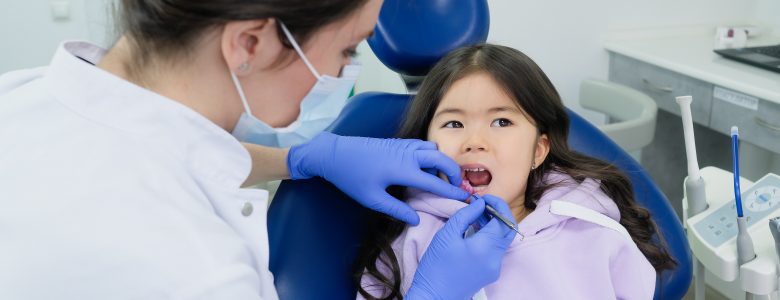
Important things to know about baby teeth
Baby teeth, also known as primary teeth, are the first set of teeth that a child develops, typically starting to emerge around the age of six months. Many parents may underestimate the importance of baby teeth, assuming that they are temporary and will eventually fall out. However, these tiny teeth actually play a significant role in a child’s overall oral health and development.
At Petit Smiles, we believe it is essential to provide you with valuable information about infant teeth. Understanding the significance of baby teeth can help parents make informed decisions regarding their child’s dental care. Let’s explore some important facts about baby teeth:
They serve important functions
Baby teeth serve several crucial functions in a child’s oral development. They enable children to chew food, speak clearly, and smile confidently. Additionally, baby teeth help maintain proper spacing in the jaw, ensuring there is enough room for permanent teeth to grow in correctly.
They can still get cavities
Contrary to popular belief, baby teeth are not immune to dental caries. Just like adult teeth, baby teeth can develop cavities. It is vital to establish a good oral hygiene routine early on. Brush your child’s teeth twice a day using a soft-bristled toothbrush and fluoride toothpaste. Limiting sugary snacks and drinks can also help prevent tooth decay.
Teething can be painful
The process of teething, when a baby’s teeth begin to erupt through the gums, can be uncomfortable for infants. They may experience symptoms such as gum soreness, irritability, and difficulty sleeping. Parents can provide relief by giving their baby something safe to chew on, like a chilled teething ring or a clean, wet washcloth. Applying gentle pressure to the gums with a clean finger can also alleviate discomfort.
Baby teeth fall out naturally
Around the age of six, baby teeth start to loosen and fall out as permanent teeth begin to emerge. This natural process typically continues until the age of 12. Each baby tooth plays its part in paving the way for the permanent teeth to take their place. As baby teeth fall out, it is important to encourage your child to wiggle the loose tooth gently to aid in its natural removal.

Early tooth loss can cause problems
If a baby tooth is lost prematurely due to trauma or severe decay, it can lead to complications. The surrounding teeth may shift into the empty space, disrupting the alignment of the permanent teeth. This can result in orthodontic issues that may require corrective treatments later in life. It is important to protect baby teeth and seek prompt dental care if any issues arise.
Regular dental checkups are essential
While baby teeth are temporary, they still require proper care. Regular dental checkups are crucial for maintaining your child’s oral health. Dentists can monitor the development of baby teeth, identify potential issues, and provide appropriate treatments or preventive measures. These visits also allow children to become familiar with the dental environment, reducing fear or anxiety associated with dental visits later in life.
Establishing good oral hygiene habits early on
Teaching your child good oral hygiene habits from a young age sets the foundation for a lifetime of healthy teeth and gums. As soon as your child’s first tooth appears, it is recommended to start brushing their teeth using a small, soft-bristled toothbrush and a smear of fluoride toothpaste. Encourage your child to spit out the toothpaste but avoid rinsing with water to allow the fluoride to continue protecting their teeth. As your child grows, guide them in proper brushing techniques and ensure they continue to brush their teeth twice a day.
Introducing flossing and mouthwash
Once your child’s teeth start to touch each other, usually around the age of two to three, it is time to introduce flossing into their oral hygiene routine. Using child-friendly floss picks or flossers, gently guide the floss between their teeth and along the gum line. Gradually teach them the correct technique and supervise their flossing until they can do it independently. Mouthwash can also be introduced as an additional step to maintain oral hygiene. Choose a child-friendly, alcohol-free mouthwash and supervise your child while they swish and spit.
Healthy diet for healthy teeth
A balanced diet plays a significant role in maintaining healthy baby teeth. Encourage your child to eat a variety of nutritious foods, including fruits, vegetables, whole grains, and dairy products. Limit their consumption of sugary snacks, sodas, and juices, as these can contribute to tooth decay. Drinking water throughout the day, especially after meals and snacks, helps rinse away food particles and reduce the acidity in the mouth.
Setting a positive example
Children often learn by observing their parents’ behavior. Set a positive example by prioritizing your own oral health. Let your child see you brushing your teeth, flossing, and visiting the dentist regularly. Make oral care a fun and interactive experience for the whole family by brushing and flossing together.
| Recommendations |
| 1. Brush your child’s teeth twice a day with a soft-bristled toothbrush and fluoride toothpaste. Limit sugary foods and drinks to prevent tooth decay. |
| 2. Provide your child with a safe item to chew on, such as a chilled teething ring, as their teeth start to erupt. This can help alleviate discomfort. |
| 3. Schedule regular dental check-ups for your child, even though baby teeth will eventually fall out. This ensures their teeth and gums remain healthy. |
| 4. Encourage your child to develop good oral hygiene habits from an early age, such as proper brushing and flossing techniques. |
| 5. Teach your child about the importance of taking care of their teeth and explain how baby teeth serve important functions for their overall oral health. |
| 6. Be mindful of any signs of tooth decay or early tooth loss. If you notice any issues, seek prompt dental care to prevent further complications. |
| 7. Maintain a balanced diet for your child that includes a variety of nutritious foods to support their overall oral and dental health. |
| 8. Create a positive and fun dental care routine for your child by making brushing and flossing enjoyable activities. Consider using child-friendly toothbrushes and toothpaste flavors. |
| 9. If your child participates in sports or activities that could risk dental injuries, ensure they wear a mouthguard for protection. |
| 10. Set a good example by practicing good oral hygiene yourself and showing your child the importance of taking care of their teeth. |
Remember, each child is unique, so adapt these recommendations to suit your child’s specific needs and consult with a pediatric dentist for personalized advice.
In conclusion, it is evident that baby teeth play a vital role in a child’s oral health and development. By understanding their importance and taking proactive measures, parents can ensure that their child’s baby teeth fulfill their functions effectively and pave the way for the healthy growth of permanent teeth. Encouraging good oral hygiene habits, establishing regular dental checkups, and promoting a healthy diet contribute to a lifetime of optimal oral health for your child. Remember, a healthy smile begins with baby teeth!
If you have more specific questions or concerns, remember that you can contact us and find us at Petit Smiles in Coral Gables and Doral, Miami.
Contents
- They serve important functions
- They can still get cavities
- Teething can be painful
- Baby teeth fall out naturally
- Early tooth loss can cause problems
- Regular dental checkups are essential
- Establishing good oral hygiene habits early on
- Introducing flossing and mouthwash
- Healthy diet for healthy teeth
- Setting a positive example


